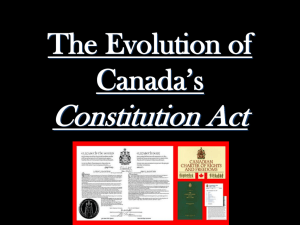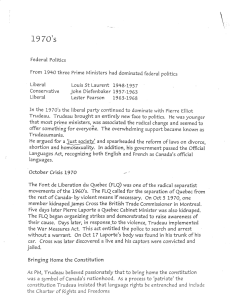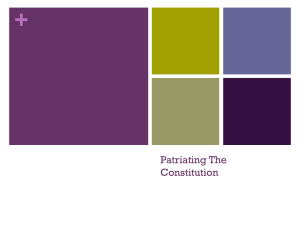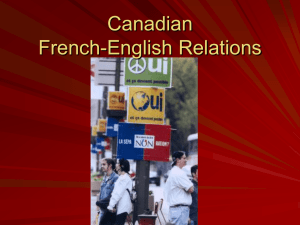Chapter 8 Study Questions
advertisement
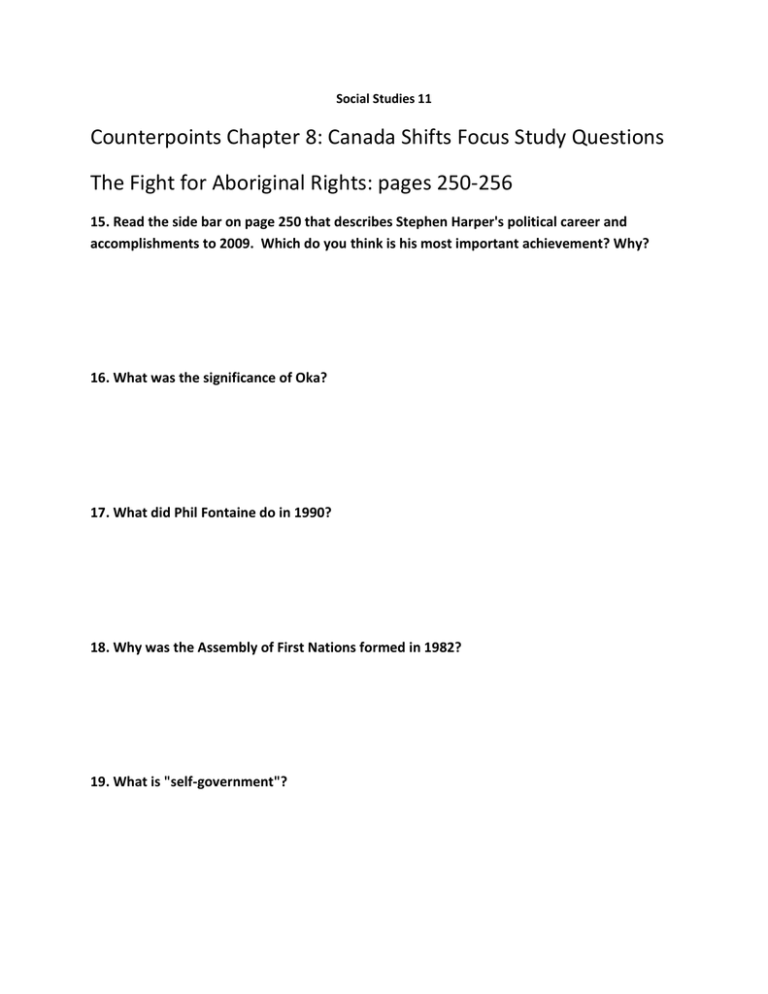
Social Studies 11 Counterpoints Chapter 8: Canada Shifts Focus Study Questions The Fight for Aboriginal Rights: pages 250-256 15. Read the side bar on page 250 that describes Stephen Harper's political career and accomplishments to 2009. Which do you think is his most important achievement? Why? 16. What was the significance of Oka? 17. What did Phil Fontaine do in 1990? 18. Why was the Assembly of First Nations formed in 1982? 19. What is "self-government"? 20. What are "specific claims"? 21. Give an example. 22. What are "comprehensive claims"? 23. Which type of land claim is most common in BC? Why? 24. BC 's Aboriginal land claims account for 110% of BC's land. The government is willing to transfer only 5% of BC's land to First Nations. Why? 25. What did the Nisga'a settlement include? 26. What is the significance of the Supreme Court's ruling in the Delgamuukw case? 27. Why was Nunavut created in 1999? 28. Who is Tomson Highway? 29. Who is Daphne Odjig? 30. Who is Joseph Boyden? 31. Who is Douglas Cardinal? 32. Who was Bill Reid? 33. Who is John Kim Bell? 34. Who is Susan Aglukark? 35. What did the Royal Commission on Aboriginal Peoples conclude after five years of study? 36. Summarize the 2006 Assembly of First Nations report card for the government's progress in meeting the Royal Commission's recommendations. Constitution and Discord: pages 257-264 37. What does the term "patriate" mean? 38. Why did PM Trudeau want to patriate Canada's Constitution? 39. What is "sovereignty association"? 40. What would it include? 41. What is meant by the term "distinct society"? 42. What was the outcome of the 1980 Quebec referendum on sovereignty association? 43. What was the British North America Act? 44. What is an "amending formula"? 45. What did the provinces premiers fear if the Constitution was patriated? 46. What was the "Kitchen Accord"? 47. What is the "non withstanding clause"? 48. Under what conditions can Canada's Constitution be changed? 49. Why did Quebec's Premier Levesque refuse to sign the new Constitution? 50. When did the new Constitution come into effect? 51. What happened to the Liberal Party after Pierre Trudeau resigned as leader on February 28, 1984? 52. Comment on Matthew Coon Come's speech at the Harvard Center for International Affairs in 1996. 53. Why did Brian Mulroney raise the issue of Canadian Unity during the 1984 federal election? 54. What issues did PM Mulroney face when he reopened discussions about the Constitution with the provinces? 55. What was the "Meech Lake Accord"? 56. What did it offer? 57. To what did its opponents object? 58. Why did the Meech lake Accord fail to pass? 59. Who was Elijah Harper? 60. What is the "Bloc Quebecois"? 61. What was included in the Charlottetown Accord? 62. What happened in the 1992 referendum on the Charlottetown Accord? 63. Why might have the Quebec government have held another referendum on separation in 1995? 64. What happened? 65. How did PM Chretien try to oppose future sovereignty referendums in Quebec? 66. What is the "Clarity Act"? 67. Who replaced Jean Chretien as leader of the federal Liberal Party and Prime Minister in 2002? 68. Why was Paul Martin's government eventually defeated in 2006? New Economic Ideas: pages 265-270 69. What is a "national debt"? 70. Why did it grow in the 1980s? 71. How did PM Mulroney plan to address Canada's economic problems? 72. What was the result in 1990? 73. What was the "Free Trade Agreement"? 74. What did the FTA's supporters think it would do for Canada? 75. What did the FTA's opponents think it would do for Canada? 76. What is "NAFTA"? 77. What did its opponents fear? 78. Read the side bar on page 267 that describes Brian Mulroney's political career and accomplishments. Which do you think is his most important achievement? Why? 79. How did Jean Chretien try to deal with the national debt when he formed Canada's government in 1993? 80. What caused financial woe for governments in 1994? 81. How did the federal government deal with its huge debt? 82. Read the side bar on page 268 that describes Jean Chrétien’s political career and accomplishments. Which do you think is his most important achievement? Why? 83. What is meant by the term "globalization"? 84. How do its supporters believe it benefits less developed countries? 85. What impact has globalization had on workers in more developed countries? 86. What is the "Kyoto Protocol"? 87. Why might Canada not have met its target for reducing greenhouse gases? 88. Since Chapter 1 this text book has provided sidebars that highlight the careers of Canadian Prime Ministers from Wilfrid Laurier to Stephen Harper. Four have been ignored. Which are they and why might they have been omitted. A New Era of International Action: pages 271-279 89. List two events in the early 1980s that caused Cold War tensions. 90. How did PM Trudeau address these tensions? Was he successful? 91. How did PM Mulroney's approach to international relations differ from PM Trudeau's? 92. How might the US Star Wars project have encouraged the USSR to end the Cold War? 93. Why might Mikhail Gorbachev have taken steps to end the Cold War? 94. What happened at Tiananmen Square? 95. What replaced the Cold War? 96. Why did the US lead an UN sponsored military invasion of Iraq in 1990-1991? 97. What role did Canada have in the Persian Gulf War? 98. How (and why) did Canada reach the decision to participate in the Persian Gulf War? 99. What was US President George H.W. Bush's "new world order"? 100. What happened in Rwanda in 1994? 101. What was the world's response? 102. What is "genocide"? 103. What was Canada's disgrace in Somalia? 104. Why did NATO and the UN get involved in the civil war in Yugoslavia? 105. What was Canada's role in this conflict? 106. How did Canadians feel about Canada's participation in this Civil War? 107. What is "9/11"? 108. Why did the US and Britain attack Afghanistan after 9/11? 109. What involvement has Canada had in Afghanistan since 2000? 110. Why did the US say it was invading Iraq in 2003? 111. Why do you think it invaded Iraq?
